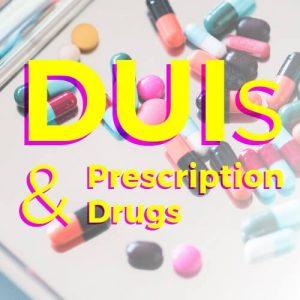
Everyone knows that driving while under the influence of alcohol or illegal drugs isn’t just dangerous, it’s against the law. But what about prescription medications that your doctor says you should be taking? Can they affect your driving ability?
Most people can’t stop driving simply because they are taking a new drug for health reasons. It’s not uncommon for older adults to be taking multiple prescription drugs at one time. Although drivers over 65 are the least likely to be involved in an alcohol-related crash, according to the Centers for Disease Control and Prevention (CDC), they are also most likely to be taking multiple medications on a daily basis. Are they breaking the law and putting others at risk?
Is It Illegal to Drive While Taking Prescription Drugs?
While laws differ from state to state, it’s important to know that you can get a driving while intoxicated (DWI) or driving under the influence (DUI) charge from taking legal prescription medications. How your medications affect you depend greatly on the medication and its side effects.
If you get behind the wheel, it’s crucial that you understand how prescription drugs can affect your driving and what you can do to prevent an accident. You could be putting yourself, your passengers, and others at risk by driving while taking your prescription medications.
For a free legal consultation, call 800-537-8185
Driving While Taking Prescription Drugs: What Are the Risks?
When your doctor writes a much-needed prescription to address a sinus infection that just won’t quit, chances are you’re relieved and ready to be on your way. You just want to feel better and do not give much thought to how the medication could affect you in a negative way. But taking prescription drugs affects everyone differently, and drivers must take extra care to ensure that they are not driving under the influence of a legal drug that will impair them on the road.
Even when the medication is legal, driving while taking the prescription drug may be illegal.
Check the Side Effects of Any Medication
You may be thinking of a sleeping pill, but it’s not just sleep medications and other drugs that slow you down; stimulants can make it difficult for drivers to judge distances and encourage risk taking according to the National Institute on Drug Abuse (NIH). Some of the most common prescription drugs that affect driving include:
- Antidepressants
- Pain medications
- Antibiotics
- Insulin
- Anti-inflammatories
- High blood pressure drugs and diuretics
- Antihistamines
- Anticonvulsants
The problem doesn’t stop with considering how a single drug will affect you, either. Drivers also must consider interactions between multiple prescription drugs they may be taking, as well as how those medications will be affected by over-the-counter drugs. It’s also important to think about homeopathic remedies and herbal supplements because these can also cause side effects and unexpected interactions with prescription and OTC drugs.
Interactions with other-the-counter medications are often difficult to research, so you may want to discuss it with your doctor or a pharmacist. When it comes to supplements, you must be especially careful. Because these supplements are often not regulated, dosage and side effects can vary widely.
Can You Get a DUI or DWI for Prescription Drugs?
This can be a complicated question because of how individual states define and charge DUIs and DWIs. The short answer is yes, you can face criminal charges simply from taking legal drugs and getting behind the wheel in most areas. Prescription drugs and driving laws are different in every state, but lawmakers are working to ensure that people who drive impaired will face the consequences regardless of the substance.
Zero Tolerance
There are two basic types of state laws regarding driving while intoxicated. Some states look to whether the driver is “incapable” of driving or is “under the influence or affected by an intoxicating drug.” Other states use the “per se” definition, meaning that having any controlled, illegal substance in your system will be considered impaired. These rules are also called “zero tolerance” laws.
Implied Consent
Impairment by prescription and over-the-counter drugs creates special problems for law enforcement. You can’t test for prescription impairment the same way you test for alcohol, such as with a roadside breath test.
Even when using blood tests, public safety officials have to consider that prescription drugs affect each person differently and there is little information on how this might show up in testing. One person may have a high level of the medication in their blood but show very few effects. Others could be impaired with very little of the drug in their system.
Most states, including Arkansas, Mississippi, and Louisiana, have implied consent laws. When you get behind the wheel, you are implicitly consenting to testing for drug and alcohol use. This applies if the police stop you for poor driving behaviors or an accident occurs. Even states such as Alabama that do not have implied consent laws generally still require testing in serious or fatal accidents.
Different Folks, Different Strokes
Even when a legal prescription drug is in a person’s system, whether this will rise to the level of driving while impaired will be up to the experts. Each state defines prohibited substances differently. For example, in these states, the type of drugs prohibited is defined as:
- Alabama: A controlled substance or any substance which impairs mental or physical faculties.
- Arkansas: A drug, substance, or immediate precursor listed in Schedules I through VI (Section 5-64-101-215)
- Mississippi: Any substance other than intoxicating liquor that causes impairment, any illegal drug or controlled substance
- Louisiana: Virtually all controlled substances in Schedules I, II, III, IV and V, prescription and OTC medications
Even if it is more difficult for prosecutors to prove that a driver was impaired by a prescription drug or a combination of Rx and OTC drugs than it is to prove drunk driving, that does not mean they aren’t willing to try. This is especially true when drivers mix more than one drug, ignore warning labels, exceed the dosage, or take a controlled substance without a valid prescription.
Impairment Is Impairment
Moreover, even if a driver impaired by legal medications avoids criminal consequences, this evidence can be used in a lawsuit against the driver to prove their impairment caused the accident. So, while the issue of driving under the influence of drugs is more complicated when the drugs are legal, it is crucial that drivers be aware of the dangers and consequences.
Fact Check: What Is the Difference Between Dui and Dwi?
It depends on the state. Some states use just one term for all impaired driving. Other states use DWI to refer to alcohol intoxication and DUI for driving while impaired by other drugs. OWI and OUI are similar abbreviations used in some states. Regardless of the letters, the important thing to take away is that someone charged with any of these offenses is facing serious consequences.
Click to contact our personal injury lawyers today
Tips for Reducing the Risk of Mixing Prescription Medications and Driving
There are several things drivers can do to avoid a prescription drug DUI. Most importantly, drivers must talk to their doctors. Not only should people be asking their doctors and pharmacists about their medications, but these professionals need to know every OTC and herbal supplement you are taking to fully explain any possible drug interactions.
Here are some additional tips for ensuring you stay both healthy and safe on the road:
- Read the fine print on all medications, OTC drugs, and supplements. This will help you fully understand the side effects and any possible interactions.
- Avoid driving when you are taking a new medication until you know how it will affect you.
- Talk to your doctor about changing the timing of your medication to before bed if you are concerned about how a drug will affect you, especially if it makes you drowsy.
- As much as possible, try to see one doctor and go to the same pharmacy. This will help ensure that all your providers are on the same page about your medications and how they interact.
Understanding the Civil Consequences of a Prescription Drug DUI
Regardless of whether a driver faces charges for prescription drug DUI or not, they could have serious civil concerns if their medication caused impairment, which contributed to a crash. They may be liable for the accident and the losses and expenses incurred by victims. In some cases, they could have both criminal and civil cases pending against them.
When someone causes an accident, they may be legally responsible for the injuries and damages that occurred. This is true even if they were not impaired because of a medication. An at-fault driver can be held accountable when they make a minor mistake that could happen to any of us. When you pair this with prescription drug impairment, the case may be even easier to prove.
Accident victims can file a claim based on the at-fault driver’s auto liability insurance provider, requesting a settlement that covers a range of damages they experienced, such as:
- Medical bills
- Income losses
- Disability or disfigurement
- Property damages
- Pain and suffering
If they cannot get a settlement from the insurer, they may be able to sue the driver and ask the civil court to award them compensation based on their losses. Dangerous drugs lawyers can help accident victims secure the compensation they need to rebuild their life.
Have You or Someone You Love Been Injured By an Impaired Driver?
If you were injured in an accident and suspect prescription drugs impaired the other driver, contact us for a free case evaluation. These claims require specific evidence to prove that the drug caused the accident. We will work with you on a contingency fee basis to gather this evidence and prove your case. You may be eligible to file a claim for medical costs, emotional distress, and further damages.
Fill out our free case evaluation form to see if you are eligible for a claim. A motor vehicle accident attorney at the Morris Bart law firm will assist you in the evaluation process. Initial consultations are free. We have office locations throughout Louisiana, Mississippi, Alabama, and Arkansas. Call us at 1-800-537-8185 today.
Questions?Call 800-537-8185
to find a Morris Bart office near you.





